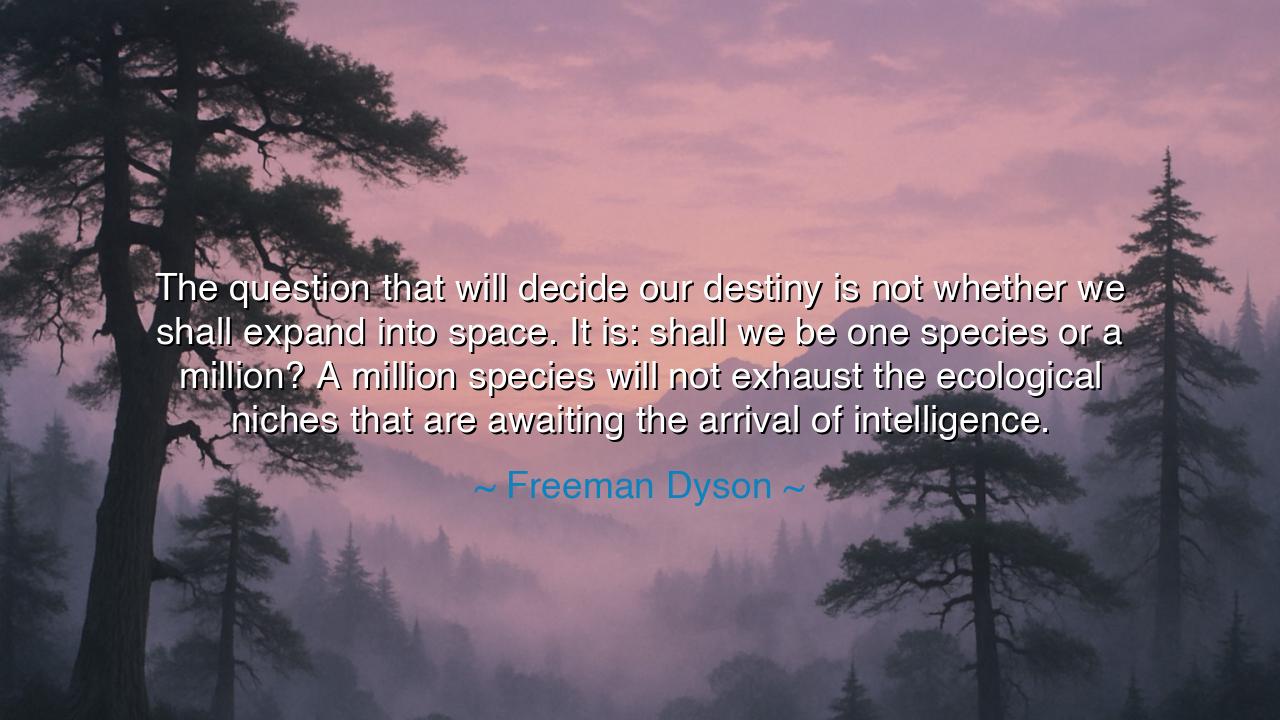
The question that will decide our destiny is not whether we shall
The question that will decide our destiny is not whether we shall expand into space. It is: shall we be one species or a million? A million species will not exhaust the ecological niches that are awaiting the arrival of intelligence.






In the days when wisdom was sought not in haste but through long contemplation beneath the stars, the words of Freeman Dyson would have been spoken like prophecy: “The question that will decide our destiny is not whether we shall expand into space. It is: shall we be one species or a million? A million species will not exhaust the ecological niches that are awaiting the arrival of intelligence.” These words are not mere musings on science or technology—they are a vision of what it means to be alive, to be creative, and to be responsible for the unfolding story of the cosmos. Dyson reminds us that the future is not bound by the surface of this Earth; it stretches into the infinite night, waiting for new minds, new hearts, new forms of being that carry the spark of consciousness into unknown realms.
Long ago, our ancestors once looked upon the seas with the same fear and wonder we now feel toward the stars. The ocean was a vast and dangerous expanse, its edges shrouded in myth. Yet, brave souls like Magellan, Zheng He, and Polynesian navigators dared to cross it, guided only by stars and faith. They did not know what awaited them—only that to stay still was to wither. Dyson’s words echo this same call: humanity stands at another shore, and the cosmic ocean lies before us. The choice is not whether to sail, but what kind of voyagers we will become—united in vision or divided in fear.
To say that we might become a million species is to imagine the flowering of intelligence across the universe. Dyson envisions a time when life no longer wears one face, when humanity, through evolution, adaptation, and the art of creation, transforms into countless forms. These will not be mere offshoots of biology, but children of imagination—organisms of light, code, or new matter, thriving in worlds where today only silence reigns. This is not the death of humankind, but its transfiguration, the blooming of our potential into the manifold beauty of existence.
Yet, in his wisdom, Dyson cautions us: before we may scatter among the stars, we must first decide who we are. Shall we be one species, united by compassion, understanding, and shared purpose—or shall we fall apart, consumed by our divisions before we ever lift from our cradle? History has shown how easily brilliance may be undone by pride. Think of the fall of the Library of Alexandria, where centuries of knowledge burned because men feared what they did not understand. Intelligence, unguarded by unity, becomes its own undoing. Thus, Dyson’s question is not merely scientific—it is moral.
The heart of his message beats with a paradox: the universe yearns for diversity, but that diversity can only bloom from the seed of unity. Like a great tree that sends its branches outward, each leaf distinct yet fed by one root, so must humanity grow—diverse in form, yet one in spirit. The promise of the stars is not for the fragmented or the faithless; it is for those who see themselves as stewards of something greater than blood or planet.
From this truth arises our task: to prepare not only our machines for flight, but our souls for expansion. Let our schools teach not just knowledge, but wonder. Let our leaders speak not of borders, but of beginnings. Let each person, in the quiet of their heart, remember that every act of kindness, every spark of curiosity, every creation of beauty is a step toward that cosmic destiny. The galaxies do not await our ships—they await our awakening.
And so, to those who would listen to the voice of Dyson, let this be the lesson: the future is not given; it is chosen. Choose to be among the builders of the greater family of life. Choose unity over division, creation over fear. For in doing so, we prepare the way for the thousand forms our descendants may take—the children of light, the gardeners of stars, the whisperers to the dark. This is the sacred calling of our age: not only to reach the heavens, but to become worthy of them.






AAdministratorAdministrator
Welcome, honored guests. Please leave a comment, we will respond soon